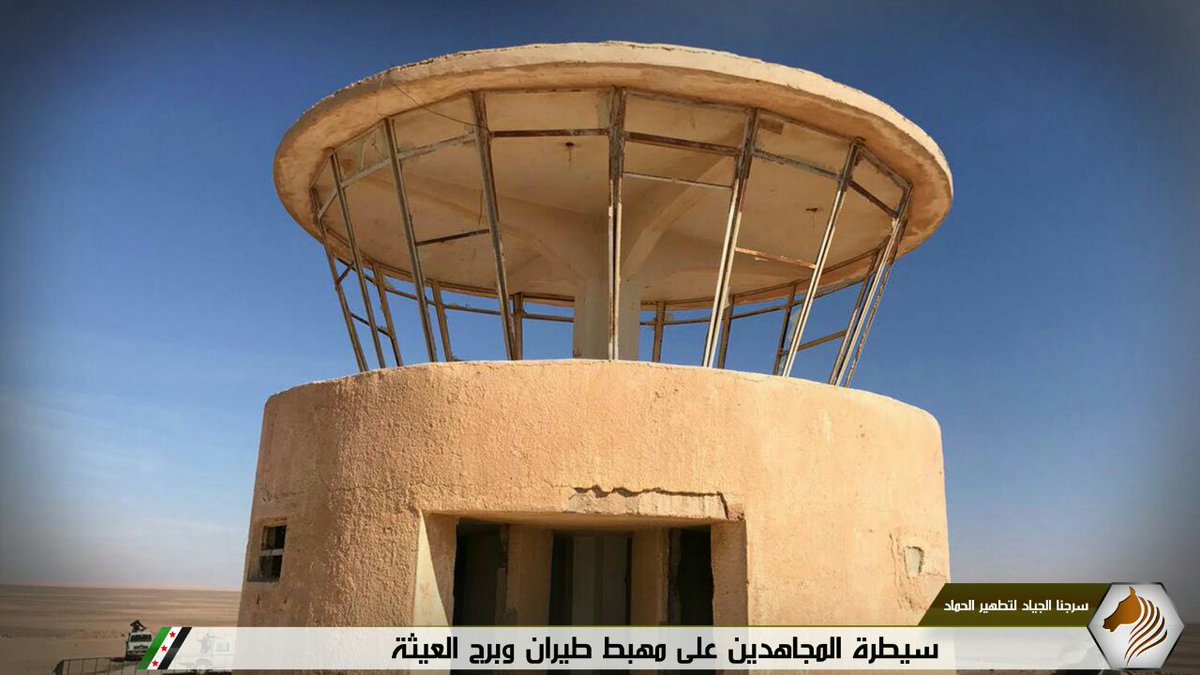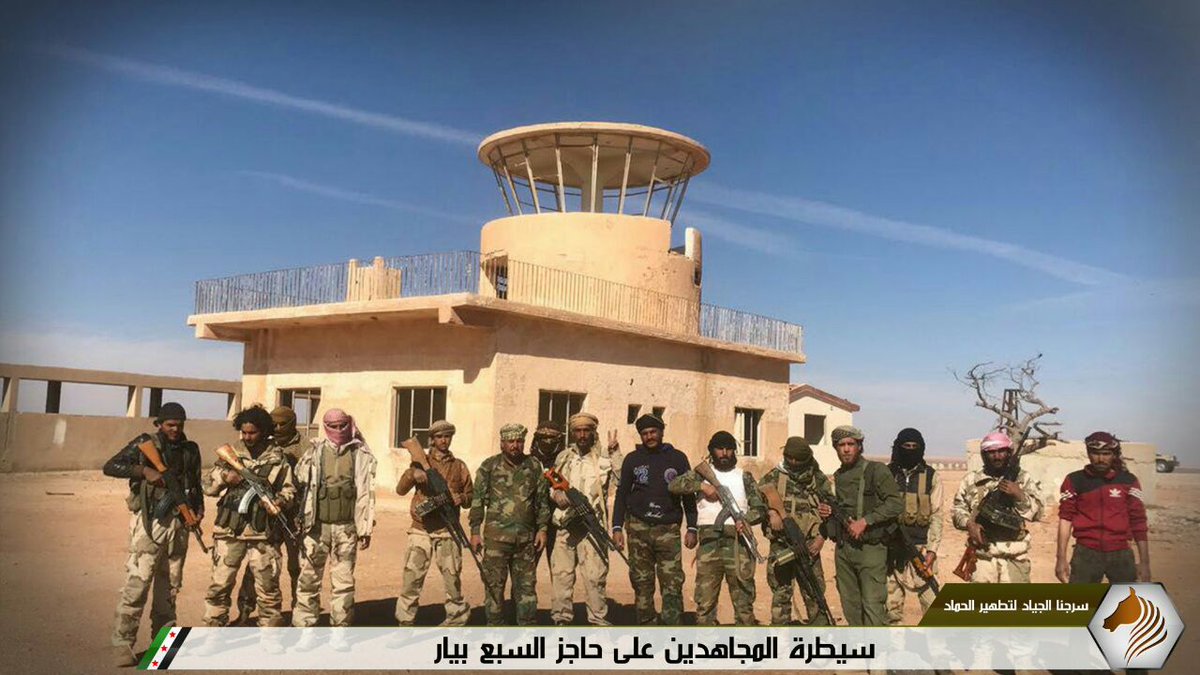
'FSA factions managed to expel Daesh from vast swaths of lands which extends more than 20 km in the eastern Qalamon area which the rebels are attempting to link it with the Syrian Badiyah in order to lift the siege on it.
The gains were the result of two offensives. The first was launched under the banner ‘ Repelling the Transgressors’ in the eastern Qalamon front with the participation of the Assud Al-Sharqiyah, the Abdou Martyr Forces, Jaysh Al-Islam and the Rahman Legion who succeeded in liberating dozens of positions in that area, including the strategic Al-Afai Mountain which was the last main stronghold of Daesh in the eastern Qalamon.
The second was launched with the participation of Assud Sharqiya, Abdou Martyrs Forces and the Qaryatyn Battaion who managed to liberate the Tayss area, the Scientific Research Company, the Makhol Checkpoint, the Abu Risha dam, the Dada Checkpoint, the Saab Bayar area and the Mahassah crossroad on the Abu Shamat highway in the Syrian Badiya.
Saad Al-Diri, member of the Assud Sharqiya media office, told D24 that ‘ The organization have suffered heavy casualties since the start of the offensive. Around 23 of their affiliates were killed and more than 40 others were wounded. The Assud Sharqiya sustained 2 casualties in addition to some injuries. “
He added, “ the Assud Sharqiyah managed to capture an arms depot belonging to Daesh, in addition to 25 Kalashinkov rifles, 5 PKC machine guns and three 14.5 mm anti-aircraft, as well as a tank and 5 four-wheel drive vehicles.”
Clashes are still taking place between the FSA factions and Daesh in the Mahasah area which the rebels are trying to take over in order to lift the siege imposed on the eastern Qalamon, which has been imposed by Daesh and Assad’s forces, and then move deep into the Syrian Badiya, mainly to the Alyaniya and Khuneifiss, which are under the control of the organization.
If the FSA capture the Mahassah area they will cut off the only supply route of the organization in the Beer and Tel Shahab areas, as well as the Safa and Malah hills. It is surrounded by Assad’s forces from two sides, the first of which is the Seen Airport and the second is the Suwaday province, while the remaining areas are controlled by the rebels.
Talass Salama, the general commander of the Assud Sharqiya, confirmed to D24 that’ the battles will continue until we the siege on eastern Qalamon is lifted and expel Daesh from the entire of the Syrian Badiya from which we would advance to Deir Ezzor, which has been under the control of the group for more than three years, and liberate it.’
If the FSA capture the Mahassah area they will cut off the only supply route of the organization in the Beer and Tel Shahab areas, as well as the Safa and Malah hills. It is surrounded by Assad’s forces from two sides, the first of which is the Seen Airport and the second is the Suwaday province, while the remaining areas are controlled by the rebels.
Talass Salama, the general commander of the Assud Sharqiya, confirmed to D24 that’ the battles will continue until we the siege on eastern Qalamon is lifted and expel Daesh from the entire of the Syrian Badiya from which we would advance to Deir Ezzor, which has been under the control of the group for more than three years, and liberate it.’
Despite the fact that the FSA in eastern Qalamon were not backed by any logistic or ground support by the international coalition, they have succeeded so far to liberate hundreds of km from Daesh. The factions operating in that region are relying only on basic weapons and the strong will of their manpower which is the main factor that led to their success against the organization.
Jaysh Assud Sharqiya are among the most effective in the fight against Daesh since they have fought the regime since they faction was formed and were also among the first who fought against the organization in Deir Ezzor until 2014. Then, they moved to the eastern Qalamon which is now their base from which they would advance to Deir Ezzor.
Jaysh Assud Sharqiya, in addition to other factions from Deir Ezzor, are the most popular among the locals in the province. They are the best alternative for Daesh in the province and if the advanced to the province, the liberation of it would be easy because of the strong local support to those factions that would trigger an inner resistance against the organization and, therefore, facilitating the liberation process.
If those factions were overlooked and the liberation of Deir Ezzor was given to both, the SDF and Assad’s forces, It would push many of the locals to join the ranks of Daesh to prevent those parties from entering into their province for ideological and tribal differences.'
Jaysh Assud Sharqiya are among the most effective in the fight against Daesh since they have fought the regime since they faction was formed and were also among the first who fought against the organization in Deir Ezzor until 2014. Then, they moved to the eastern Qalamon which is now their base from which they would advance to Deir Ezzor.
Jaysh Assud Sharqiya, in addition to other factions from Deir Ezzor, are the most popular among the locals in the province. They are the best alternative for Daesh in the province and if the advanced to the province, the liberation of it would be easy because of the strong local support to those factions that would trigger an inner resistance against the organization and, therefore, facilitating the liberation process.
If those factions were overlooked and the liberation of Deir Ezzor was given to both, the SDF and Assad’s forces, It would push many of the locals to join the ranks of Daesh to prevent those parties from entering into their province for ideological and tribal differences.'


No comments:
Post a Comment